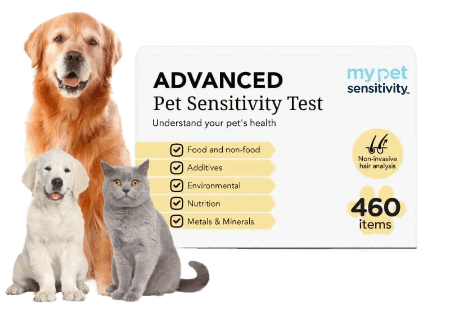The Critical Distinctions Every Dog Owner Should Know
When it comes to the health of our beloved canine companions, understanding the nuances between allergies and sensitivities is crucial. Many dog owners use these terms interchangeably, but they represent very different health scenarios. Knowing the difference can help you provide the best care for your furry family member, ensuring they lead a happier, healthier life. This guide will explore these distinctions thoroughly, empowering you as a pet parent with knowledge and practical advice.
Allergies vs. Sensitivities
What are Allergies in Dogs?
Allergies occur when a dog's immune system overreacts to foreign substances (allergens) that it has become overly sensitive to. This reaction can manifest in various forms, such as skin irritation, gastrointestinal issues, or respiratory distress. Common allergens include certain foods, pollen, dust mites, and flea bites.
Understanding Sensitivities in Dogs
Unlike allergies, sensitivities in dogs do not involve the immune system. They are typically reactions to dietary or environmental factors that cause discomfort without immune involvement. Symptoms can overlap with allergies but are generally less severe and are often limited to digestive upset like diarrhea or gas.
Key Differences
The primary difference between allergies and sensitivities lies in the body's response. Allergic reactions are immune responses, potentially leading to more severe health issues and requiring different treatment approaches. Sensitivities, while uncomfortable, are generally less dangerous and can often be managed by simple avoidance or diet changes.
Understanding Canine Allergies: More Than Just a Reaction
Allergies in dogs are similar to those in humans, involving an immune system response to a substance that is typically harmless. The immune system misidentifies this substance as a threat, triggering a reaction designed to protect the body. This reaction can manifest in various ways, including skin irritations, digestive problems, and respiratory distress.
Common Allergens:
- Environmental Allergens: Pollen, mold, and dust mites can trigger allergic reactions in dogs, much like in humans. These are often seasonal and can cause symptoms such as itching, red skin, and sneezing.
- Food Allergies: Some dogs develop allergies to specific ingredients in their food. Common culprits include beef, chicken, dairy, and wheat. Symptoms may include gastrointestinal upset such as vomiting and diarrhea, as well as skin issues.
- Flea Allergy Dermatitis: A severe reaction to flea bites is one of the most common allergies in dogs. The saliva of a single flea can induce an intense allergic response, characterized by itching, redness, and skin infections.
Deciphering Canine Sensitivities: The Subtler Side of Discomfort
Unlike allergies, sensitivities in dogs do not involve the immune system. Sensitivities, or intolerances, are typically linked to the digestive system's response to certain foods or substances. These reactions can be gradual and less intense but still profoundly affect your dog's quality of life.
Common Sensitivities:
- Food Intolerances: Many dogs have difficulties digesting certain types of foods, leading to symptoms such as gas, bloating, diarrhea, or constipation. Common triggers include lactose, gluten, and certain proteins.
- Chemical Sensitivities: Dogs can be sensitive to synthetic additives, pesticides, and cleaning products, which can cause gastrointestinal upset and dermatological issues.
Identifying and Addressing Sensitivities:
Pinpointing sensitivities can be challenging due to the delayed nature of the reactions. Elimination diets, where ingredients are removed from the diet one at a time, are a common method for identifying problematic foods. Once identified, managing sensitivities involves avoiding the triggering substances.
Practical Tips for Managing Allergies and Sensitivities
Sensitivity Testing: A Key Tool in Your Management Arsenal
One of the most effective ways to manage your dog's allergies and sensitivities is to identify what triggers them. Sensitivity tests can provide invaluable insights into your dog's specific reactions to various substances, including food ingredients and environmental factors.
- How Sensitivity Tests Work: These tests typically involve hair or saliva samples. They assess how your dog reacts to a wide range of substances and pinpoint specific triggers.
- Benefits of Sensitivity Testing: Knowing exactly what affects your dog allows you to tailor their environment and diet to avoid these triggers, potentially reducing or even eliminating symptoms.

Testing for 460 commercial pet food ingredients
10% Off with Code: PETPICKS10
Dietary Management: Tailored Nutrition for Better Health
Feeding your dog a diet that minimizes exposure to known allergens is crucial. Here are some tips for dietary management:
- Hypoallergenic Diets: These diets use protein sources that are less likely to cause allergic reactions, such as hydrolyzed proteins or novel proteins your dog has not been exposed to.
- Consistent Diet: Avoid frequent changes in your dog's diet which can complicate the identification of triggers. Stick to a vet-recommended formula that suits your dog’s specific needs.
Regular Vet Visits: Proactive Healthcare
Regular check-ups with your veterinarian are essential to effectively manage allergies and sensitivities:
- Early Detection: Regular visits can help catch issues before they escalate, allowing for more effective management with less intensive treatment.
- Tailored Treatment Plans: Your vet can provide customized advice and treatment plans based on your dog’s specific condition and test results.
Environmental Control: Creating a Safe Space
Minimizing exposure to environmental allergens can significantly reduce allergy symptoms:
- Regular Cleaning: Vacuum regularly using HEPA filters and wash your dog’s bedding and toys frequently to reduce allergens like dust mites and pollen in your home.
- Air Quality: Use air purifiers to help remove airborne allergens and maintain a healthier environment for your dog.
Implementing Comprehensive Care Strategies
Combining sensitivity testing, dietary management, regular veterinary care, and strict environmental control creates a robust approach to managing your dog’s allergies and sensitivities. Each element plays a vital role in not only treating but also preventing the exacerbation of symptoms, ensuring your dog can lead a happier, more comfortable life.
Additional Insights: Enhancing Canine Comfort
Understanding your dog's specific health needs can significantly enhance their life quality. Whether dealing with allergies or sensitivities, the key is observation and proactive management. Keep an eye on how your dog responds to different environments and diet changes, and consult with a veterinarian to develop a tailored health plan.
Conclusion: Empowering Every Pet Parent
Armed with the knowledge of how to distinguish and manage allergies and sensitivities, you are now better equipped to care for your canine friend. Remember, every dog is unique, and what works for one might not work for another. Always prioritize professional advice and adapt your approach based on your dog's specific needs.
FAQs
What is the difference between an allergy and a sensitivity in dogs?
An allergy in dogs involves an immune response where the body reacts negatively to a substance (allergen), resulting in symptoms such as itching, swelling, or gastrointestinal issues. Sensitivities, however, do not involve an immune response but can still cause discomfort such as digestive upset. While both conditions can cause similar symptoms, allergies are typically more severe and require different management strategies.
How can sensitivity testing benefit my dog?
Sensitivity testing helps identify specific environmental or dietary substances that may cause discomfort to your dog without requiring an immune reaction. These tests can guide pet owners in customizing their dog’s diet and environment, potentially reducing or eliminating symptoms by avoiding identified triggers. This proactive approach helps in creating a more comfortable and tailored lifestyle for your pet.
Are hypoallergenic diets effective for managing dog allergies?
Hypoallergenic diets are designed to minimize the risk of triggering an allergic reaction. These diets typically include novel protein sources or hydrolyzed proteins, which the dog’s immune system does not recognize as a threat. Many veterinarians recommend hypoallergenic diets for managing allergies effectively, as they can significantly reduce symptoms and improve overall health.
What should I do if I suspect my dog has an allergy or sensitivity?
If you suspect your dog has an allergy or sensitivity, the first step is to consult with a veterinarian. They can perform tests to diagnose the condition accurately and recommend appropriate treatments or dietary changes. Regular monitoring and adjustments based on your dog’s response to these changes are crucial for managing symptoms effectively.
How often should I clean my home to help manage my dog’s environmental allergies?
Regular cleaning is essential for managing environmental allergies. Vacuuming at least twice a week with a HEPA filter vacuum cleaner and washing your dog’s bedding and toys weekly can significantly reduce the presence of allergens like dust, pollen, and dander in your home. Additionally, using air purifiers can help maintain clean air, further reducing potential triggers for your dog’s allergies.
A Loving Reminder
The information provided at ThePetPicks.com is based on research and expertise, aiming to enhance the bond between you and your dog. However, it’s essential to remember that every dog is unique. Always consult with professionals, like veterinarians or trainers, for specific concerns or advice. At ThePetPicks.com, we believe in “Trust Born from Love,” and we encourage every pet parent to make informed decisions rooted in love

